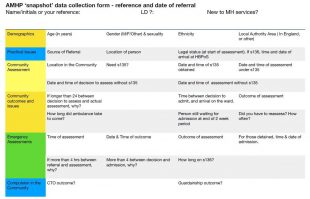Many of you will know that I remain keen to raise awareness of the vital role and value that Approved Mental Health Professionals (AMHPs) play in ensuring that people get the right help, at the right time, in the right way. There is currently no national data collection that captures their work and it’s high time their amazing efforts were recorded and recognised.
AMHPs were recently asked to complete a survey which it is hoped will plug this gap in our knowledge of the system. I am therefore privileged to host @AsifAMHP’s guest blog in which he explains why recording the valuable work you do is vital to the recognition you deserve and the future provision of effective mental health services.

"How many adults and children are detained (sectioned) under the provisions of the Mental Health Act (MHA) each year, do you think? The Care Quality Commission (CQC) and NHS England (NHSE) have a rough idea. But no one actually knows how many Mental Health Act Assessments (MHAAs) are coordinated by AMHPs.
Well, I’m hoping that quite a few of you have been helping with that. A form circulated by ADASS earlier this month aimed to encourage AMHPs across England to collect the data needed. If you and your colleagues found the time, I promise you the information you’ve provided will have made a huge difference.
 All the information provided must now be fed into an ADASS hosted survey monkey by 8 December 2017.
All the information provided must now be fed into an ADASS hosted survey monkey by 8 December 2017.
The body of data now being collated will ultimately provide:
- Evidence of work undertaken in England by AMHPs.
- Evidence and concerns from the field about resources
- Information for local and national leaders to inform future developments in mental health service provision
So why AMHPs? Well, they are the ones who make the MHA work both practically in terms of organising the assessments, and also because they are best placed to determine when adults and children should be detained.
More importantly they are often the ones advocating against detention when everyone else in the room is saying the opposite. This is because AMHPs are the ones who ultimately make the decision on whether or not to detain someone. Two doctors need to make recommendations, but the person won’t be detained in hospital unless the AMHP agrees this is necessary.
We know how many S.136s (police powers of detention) there are every year. The police provide that information themselves and it was in the region of 28,000 last year. So, on the back of that figure we can roughly estimate that AMHPs probably coordinated 28,000 MHAAs involving s136s in England and Wales last year.
But they also undertake Mental Health Act Assessments in a number of different situations, and as not all people assessed under the Mental Health Act are detained, the actual number of assessments is very unclear.
The CQC suggests that 63,000 adults and children were detained in hospitals last year and that figure is rising year on year. No one is clear if the two figures added together (91,000) really means that there were 91,000 (plus) MHAAs coordinated last year by AMHPs.
Now, given the volume and ambiguity over whose coordinating and detaining whom, getting a breakdown of this information seems quite important to me.
Last year, NHSE started counting how many adults were given ‘out of area’ (OOA) placements. But no one really understands how this happens and the impact it has on individuals and their families.
No one knows how many:
- Relatives objected to their loved ones being placed on Section 3 because of the distances involved.
- AMHPs are trucking up and down the county every day to coordinate MHAAs for adults and children placed OOA.
- How often assessments under the MHA require admission to hospital, but lack of beds mean someone has to wait in the community or worse a police cell because the AMHP cannot make an application.
- 135 warrants were sought and executed.
No one other than AMHPs really understand how frustrating it is to get all their ducks in a row just for decisions to be made or plans put in train.
So, I really hope you found the time to fill in this form. If you didn’t, although the spreadsheet deadline has lapsed, the online survey is open until December 8. This means you still have an opportunity to input data retrospectively. Either way, this is a great opportunity for others to understand and appreciate the amazing work you do."
About my guest blogger
@AsifAMHP has worked in adult social work in Approved Mental Health Professional and Best Interest Assessor roles for 15 years. He wishes more people were involved in this work and took the time to read the Mental Health Act and its Code of Practice.
Leave a comment